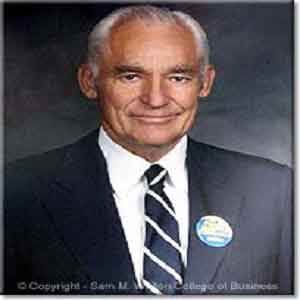Sam Walton
The man who gave us WalMart
Samuel Moore "Sam" Walton (March 29, 1918 – April 5, 1992) was an American businessman and entrepreneur born in Kingfisher, Oklahoma. He is best known for founding the retailers Walmart and Sam's Club. Growing up during the Great Depression, Walton had numerous chores to help make financial ends meet for his family as was common at the time. He milked the family cow, bottled the surplus, and drove it to customers. Afterwards, he would deliver Columbia Daily Tribune newspapers on a paper route. In addition, he also sold magazine subscriptions. Upon graduating from David H. Hickman High School in Columbia, he was voted "Most Versatile Boy".
After high school, Walton decided to attend college, hoping to find a better way to help support his family. He attended the University of Missouri as an ROTC cadet. During this time, he worked various odd jobs, including waiting tables in exchange for meals. Also during his time in college, Walton joined the Zeta Phi chapter of Beta Theta Pi fraternity. He was also tapped by QEBH, the well-known secret society on campus honoring the top senior men. Upon graduating in 1940 with a Bachelor's of Economics, he was voted "permanent president" of the class.
Walton joined JC Penney as a management trainee in Des Moines, Iowa three days after graduating from college. This position paid him $75 a month. He resigned in 1942 in anticipation of being inducted into the military for service in World War II. In the meantime, he worked at a DuPont munitions plant near Tulsa, Oklahoma. Soon afterwards, Walton joined the military in the U.S. Army Intelligence Corps, supervising security at aircraft plants and prisoner of war camps. In this position he served at Fort Douglas in Salt Lake City, Utah. He eventually reached the rank of captain.
The First Store
In 1945, after leaving the military, Walton took over management of his first variety store at the age of 26. With the help of a $20,000 loan from his father-in-law, plus $5,000 he had saved from his time in the Army, Walton purchased a Ben Franklin variety store in Newport, Arkansas. The store was a franchise of the Butler Brothers chain.
It was here that Walton pioneered many concepts that became crucial to his success. Walton made sure the shelves were consistently stocked with a wide range of goods. His second store, the tiny "Eagle" department store, was down the street from his first Ben Franklin and next door to its main (Newport) competitor. Walton leased the space mainly to preempt his competitor from expanding. It held its own, but didn't fare as well.
The Struggle
With the sales volume growing from $80,000 to $225,000 in three years, Walton drew the attention of the landlord, P.K. Holmes, whose family had a history in retail. Admiring Sam's great success, and desiring to reclaim the store (and franchise rights) for his son, he refused to renew the lease. The lack of a renewal option, together with the prohibitively high rent of 5% of sales, were early business lessons to Walton. Despite forcing Walton out, Holmes bought the store's inventory and fixtures for $50,000, which Walton called "a fair price".
With a year left on the lease, but the store effectively sold, he, his wife Helen and his father managed to negotiate the purchase of a new location on the downtown square of Bentonville, Arkansas. Walton negotiated the purchase of a small store, and the title to the building, on the condition that he get a 99 year lease to expand into the shop next door. The owner of the shop next door refused 6 times, and Walton gave up on Bentonville when his father in law, without Sam's knowledge, paid the shop owner a final visit, and $20,000 to secure the lease. He had just enough left from the sale of the first store to close the deal, and reimburse Helen's father. They opened for business with a one-day remodeling sale on May 9, 1950.
Before he bought the Bentonville store, it was doing $72,000 in sales. After the expansion, and 5 years under Walton, it was doing $250,000 in sales annually.
With the new Bentonville "5 and Dime" opening for business and, 220 miles away, a year left on the lease in Newport, the cash strapped young Walton had to learn to delegate responsibility. After succeeding with two stores at such a distance, (and with the post war baby boom in full effect, ) Sam became enthused to scout more locations, and open more Ben Franklin franchises.
In 1954, he opened a store with his brother Bud in a shopping center in Ruskin Heights, a suburb of Kansas City, Missouri. And with the help of his brother, father-in-law, and brother-in-law, went on to open many new variety stores. He encouraged his managers to invest and take an equity stake in the business; often as much as $1000 in their store or, the next outlet to open. (This motivated the managers to sharpen their managerial skills and take ownership over their role in the enterprise.) By 1962, along with his brother Bud, he owned 16 stores in Arkansas, Missouri, and Kansas (fifteen Ben Franklins and one independent, in Fayetteville).
And then came the Wal-Mart
The first true Wal-Mart opened on July 2, 1962 in Rogers, Arkansas. It was called the Wal-Mart Discount City store and located at 719 West Walnut Street. Soon after, the Walton brothers teamed up with the Stefan Dasbach, leading to the first of many stores to come. He launched a determined effort to market American-made products. Included in the effort was a willingness to find American manufacturers who could supply merchandise for the entire Wal-Mart chain at a price low enough to meet the foreign competition.
As another chain store, Meijer, grew it caught the attention of Walton. He acknowledges that his one-stop-shopping center format was based on Meijer’s innovative concept.
Contrary to the prevailing practice of American discount store chains, Walton located stores in smaller towns, not larger cities. To make his model work, he emphasized logistics, particularly locating stores within a day's drive proximity to Wal-Mart's regional warehouses, and distributed through its own trucking service. Buying in volume and efficient delivery permitted sale of discounted name brand merchandise. Thus, sustained growth— from 1977's 190 stores to 1985's 800— was achieved.
In 1998, Walton was included in Time's list of 100 most influential people of the 20th Century. Walton was honored for all his pioneering efforts in retail in March 1992, when he received the Presidential Medal of Freedom from President George H. W. Bush.
Forbes ranked Sam Walton as the richest man in the United States from 1982 to 1988(Bill Gates first headed the list in 1992, the year Walton died). Walmart operates in the U.S. and in 15 international markets, including Argentina, Brazil, Canada, Chile, China, Costa Rica, El Salvador, Guatemala, Honduras, India, Japan, Mexico, Nicaragua, Puerto Rico and the United Kingdom.


